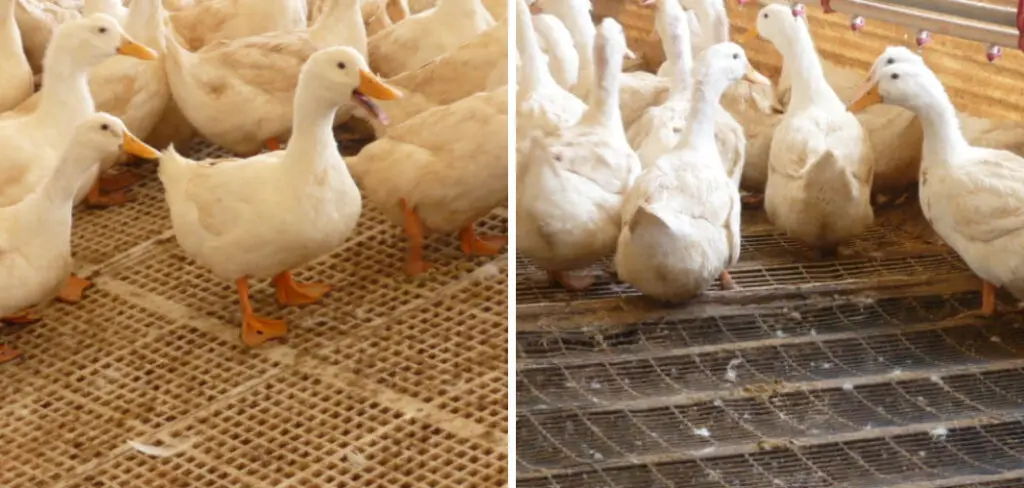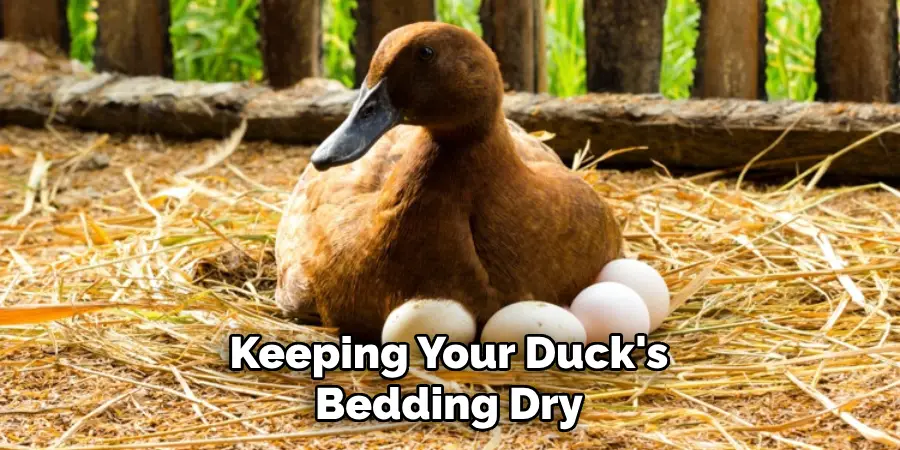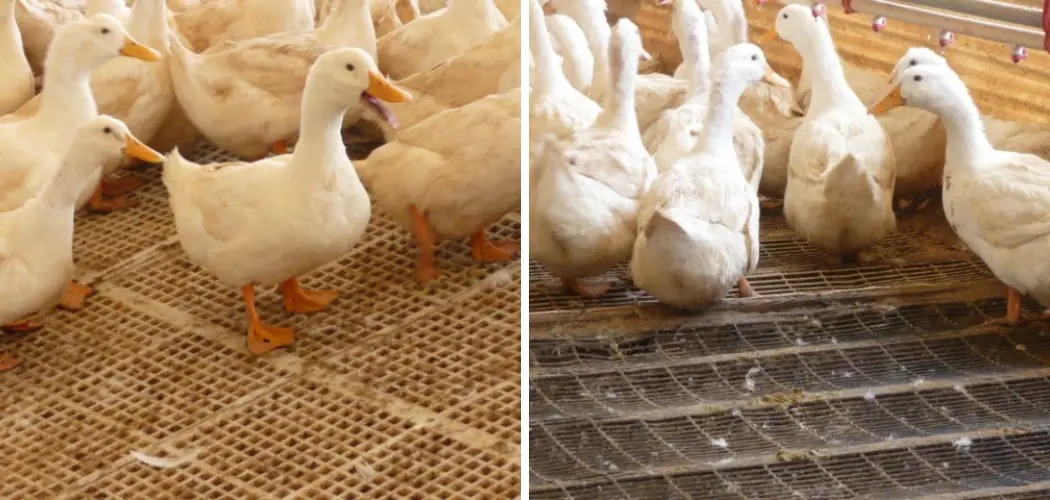Ducks are fascinating creatures that make great pets because of their friendly and curious nature. However, with being a pet owner comes the responsibility of keeping them healthy and comfortable. One important aspect of duck care is providing them with a suitable living environment, which includes their bedding.

Unfortunately, ducks can be quite messy creatures, making it challenging to keep their bedding dry. Wet bedding can cause health issues for your ducks, such as respiratory problems and skin infections.
Additionally, it can also lead to an unpleasant odor in their living space. In this guide, we will discuss various methods of how to keep duck bedding dry and ensure a comfortable and healthy living environment for your feathered friends.
Why is It Important to Keep Duck Bedding Dry?
As mentioned earlier, wet bedding can lead to several health issues for your ducks. A damp environment is an ideal breeding ground for bacteria and fungi, which can cause respiratory infections, skin diseases, and other illnesses in ducks. Moreover, if the bedding stays wet for an extended period, it can also attract pests and parasites, further compromising the health of your ducks.
Apart from health concerns, wet bedding also creates an unpleasant living space for your ducks. Ducks are clean animals, and they prefer a dry and comfortable area to rest and sleep. Wet bedding can cause discomfort and stress in ducks, leading to behavioral issues such as feather plucking or aggression.
11 Best Methods on How to Keep Duck Bedding Dry
1. Choose Appropriate Bedding Material:
The first step in keeping your duck bedding dry is choosing the right material. While straw may seem like a suitable option, it can quickly become damp and moldy. Instead, opt for materials such as pine shavings or hay that have better absorbency and ventilation properties. This will help to keep the bedding dry and fresh for longer. If you use hay, make sure to change it regularly as it can become damp quickly.

2. Use a Deep Layer of Bedding:
Ducks love to dig and burrow in their bedding, which can lead to the bottom layers becoming wet. To prevent this, try using a deep layer of bedding that is at least 6-8 inches thick. This will provide enough cushioning for your ducks while also allowing for greater absorbency. Using a deep layer of bedding also means you won’t have to change it as frequently.
3. Use a Waterproof Mat:
Placing a waterproof mat or tarp underneath the bedding can help to keep the area dry. The mat will prevent any moisture from seeping into the ground and keep the bedding from becoming damp. It is essential to choose a material that is easy to clean and dries quickly to avoid any potential health hazards for your ducks. This method is particularly helpful if you have an outdoor coop or pen for your ducks.
4. Maintain Good Ventilation:
Proper ventilation is crucial in preventing damp bedding. Make sure the area where your ducks sleep has proper airflow to allow moisture to escape. If you notice a buildup of condensation, consider adding more ventilation holes or windows to improve air circulation. Additionally, you can use fans to help with air circulation if needed.
5. Clean and Replace Regularly:
Cleaning and replacing the bedding regularly is essential in keeping it dry. Duck droppings, spilled water, and dampness from feathers can all contribute to wet bedding. Scoop out any soiled or damp bedding daily, and replace it with fresh material.

A deep clean should also be done at least once a week, where all the bedding is removed and replaced with new material. If you notice any mold or fungi growth, make sure to clean and replace the bedding immediately.
6. Use Absorbent Materials:
Apart from choosing suitable bedding materials, you can also add absorbent materials to keep the bedding dry. For example, using cat litter or sand can help in soaking up excess moisture. However, it is essential to choose non-toxic options and replace them regularly to avoid any health risks for your ducks. Using absorbent materials is particularly helpful in areas with high humidity levels.
7. Provide Dry Areas Outside:
Ducks love to play and splash around in the water, but it is essential to provide dry areas for them to rest outside of their living space. This can include a designated sunning spot or a shallow pool where they can preen and dry off after swimming.
Providing dry areas outside will reduce the amount of moisture brought into their bedding, making it easier to keep it dry. If possible, make sure these areas are also well-ventilated to prevent dampness.
8. Check for Leaks:
If you have a water source in your ducks’ living space, such as a waterer or pond, regularly check for leaks. Even minor leaks can add a significant amount of moisture to the bedding, leading to wet and unhealthy conditions. Make sure to fix any leaks immediately to prevent further damage and keep the bedding dry. This is also crucial for preventing the growth of algae, which can be hazardous to ducks if consumed.
9. Use a Coop or Shelter:
Ducks need protection from the elements, so providing them with a coop or shelter is necessary. This will not only protect them from rain and extreme temperatures but also help in keeping their bedding dry.

A sheltered area will prevent direct exposure to moisture and prevent the bedding from becoming wet. Make sure the coop or shelter is well-ventilated for proper airflow. Using a coop also makes it easier to clean and maintain the bedding.
10. Use a Bedding Powder:
Using a bedding powder, such as diatomaceous earth or lime, can help in keeping your duck’s bedding dry. These powders have absorbent properties that help in soaking up excess moisture, keeping the bedding fresh and dry. They also have antimicrobial properties that can help in preventing bacterial or fungal growth. However, make sure to use these powders sparingly as they can be harmful if ingested by ducks.
11. Install a Drainage System:
If you have an outdoor duck coop or pen, installing a drainage system can significantly improve the moisture levels in the bedding. By directing excess water away from the area, you can prevent it from seeping into the ground and making the bedding damp.
This is particularly helpful if your ducks have access to a pond or other water source in their living space. Make sure to regularly check and clean the drainage system to prevent clogging.
Following these methods on how to keep your duck bedding dry can help in creating a clean and comfortable living environment for your feathered friends. Remember to provide ample space, good ventilation, and regular maintenance to ensure healthy and happy ducks.
With proper care, your ducks will have a cozy and dry place to rest, play, and thrive. So go ahead and implement these tips to keep your ducks and their bedding dry! Happy duck keeping!
Additional Tips and Tricks to Keep Duck Bedding Dry
1. If you have multiple ducks, consider using separate bedding areas for each one. This will help prevent overcrowding and ensure that each duck has enough space to keep their bedding clean and dry.

2. Regularly cleaning your duck’s living area can also help keep their bedding dry. Remove any wet or soiled bedding and replace it with fresh, dry bedding as needed.
3. Keep an eye out for any leaks or cracks in your duck’s shelter that could be allowing water to seep in. Repair any damage promptly to prevent damp bedding.
4. Consider using a wire mesh under the bedding to allow for better ventilation and drainage. This can help keep the bedding from becoming too wet and soggy.
5. Providing your ducks with a covered area, such as a small shelter or an awning, can help protect their bedding from rain and other outdoor elements.
6. Use absorbent materials such as straw or wood shavings for your duck’s bedding. These materials will soak up moisture and keep the bedding drier for longer periods.
7. If you notice your ducks spending a lot of time in one area of their bedding, it may be a sign that the area is particularly wet or uncomfortable. Consider adding more bedding or adjusting the layout to provide better drainage.
8. During periods of heavy rain, you may need to replace your duck’s bedding more frequently to prevent it from becoming too wet and potentially causing health issues for your ducks.
9. Providing your ducks with access to fresh, clean water can also help keep their bedding dry. If they have access to a clean water source, they may be less likely to make their bedding wet with dirty or soiled water.
10. Lastly, be sure to regularly check and replace your duck’s bedding as needed. This will not only help keep it dry but also prevent any potential health issues that could arise from dirty or damp bedding.
Following these tips and tricks can help ensure that your ducks have a clean, dry, and comfortable bedding area. It is important to remember that damp bedding can not only be uncomfortable for your ducks but also lead to health issues such as fungal or bacterial infections.
Keeping their bedding dry will not only promote good hygiene but also contribute to their overall well-being. So make sure to regularly clean and maintain their living area to keep them happy and healthy.
Environmental Factors to Consider for Keeping Duck Bedding Dry
1. Proper Ventilation:
Proper ventilation is essential for maintaining the right humidity level in the duck coop. Ducks produce a significant amount of moisture through their droppings and breathing, which can make the bedding damp. Installing windows and vents in the coop allows fresh air to circulate, reducing moisture levels and preventing condensation.

2. Regular Cleaning:
Regularly cleaning the duck coop is crucial for keeping bedding dry. Remove soiled bedding and droppings daily to prevent bacteria build-up and maintain a dry environment. Deep clean the coop at least once a week by removing all the old bedding, disinfecting the floor, and replacing it with fresh bedding. This will not only keep the bedding dry but also promote good hygiene for your ducks.
3. Using Absorbent Bedding:
Choosing the right bedding for your ducks is essential in keeping their coop dry. Straw, hay, or wood shavings are highly absorbent and can help soak up any moisture in the coop. Avoid using materials like newspaper or cardboard as they don’t absorb moisture effectively and can become damp quickly. This can lead to mold growth and create an unhealthy environment for your ducks.
4. Proper Bedding Depth:
The ideal bedding depth for duck coops is around four to six inches. This allows the bedding to absorb moisture without getting too wet, ensuring that it stays dry for a more extended period. It also provides enough cushioning for the ducks and helps keep them warm during colder months. If the bedding gets too wet, replace it with fresh bedding.
5. Adequate Space:
Overcrowding can lead to increased humidity in the duck coop, making it challenging to keep the bedding dry. Make sure there is enough space for your ducks to move around and spread out their droppings. If you have a small coop, consider limiting the number of ducks you keep or increasing the frequency of cleanings to maintain a dry environment.
6. Proper Drainage:
If your duck coop is located in an area prone to heavy rain, make sure there is proper drainage around the coop. Poor drainage can lead to water pooling near the coop, which can seep into the bedding and make it damp. You can also consider placing the coop on a slightly elevated surface to prevent water from accumulating around it.

7. Regular Bedding Replacement:
No matter how well you maintain your duck coop, bedding will eventually need to be replaced. Monitor the condition of the bedding regularly and replace it when needed, especially during colder months when moisture levels are higher. This will help keep the coop dry and prevent any health issues for your ducks.
With these considerations in mind, you can ensure that your feathered friends are happy and healthy in their homes. So, take the time to implement these measures and enjoy watching your ducks thrive in a clean and dry environment! Happy duck keeping!
Frequently Asked Questions
Can I Wash My Duck’s Bedding?
Yes, you can wash your duck’s bedding. It is recommended to use a mild detergent and warm water when washing the bedding. Make sure to rinse all the soap out of the bedding thoroughly to avoid any skin irritation on your ducks. It is also important to let the bedding dry completely before putting it back in your duck’s living area.
How Often Should I Wash My Duck’s Bedding?
The frequency of washing your duck’s bedding depends on how many ducks you have and how dirty their living area gets. Generally, it is recommended to wash the bedding at least once a week. However, if you notice that the bedding is getting soiled quickly, it may be necessary to wash it more frequently. It is important to keep your duck’s living area clean and dry to maintain their health.
Can I Use a Washing Machine to Wash the Bedding?
Yes, you can use a washing machine to wash your duck’s bedding. However, it is important to use a gentle cycle and mild detergent. Avoid using any harsh chemicals or bleach as this can be harmful to your ducks. It is also important to thoroughly rinse all the soap out of the bedding and let it dry completely before putting it back in your duck’s living area.
How Do I Keep My Duck’s Bedding Dry?
Keeping your duck’s bedding dry is crucial for maintaining their health. One way to do this is by regularly removing any wet or soiled bedding and replacing it with clean, dry bedding. You can also use absorbent materials such as straw or wood shavings to help soak up moisture. Additionally, providing proper ventilation in your duck’s living area can also help prevent excess moisture and keep the bedding dry.

What If My Duck’s Bedding Gets Wet?
If your duck’s bedding gets wet, it is important to remove the wet bedding and replace it with dry bedding as soon as possible. Wet bedding can lead to bacteria growth, which can be harmful to your ducks’ health. It is also important to determine the source of the moisture and address any potential issues such as leaks or inadequate ventilation.
Can I Add Anything to the Bedding to Keep it Dry?
Yes, there are a few things you can add to your duck’s bedding to help keep it dry. Some options include adding chopped straw or pine shavings, which have natural absorbent properties. You can also sprinkle diatomaceous earth on top of the bedding, which can help absorb moisture and reduce odors. Just be sure to use food-grade diatomaceous earth and avoid using it if your ducks have respiratory issues.
Conclusion
All in all, knowing how to keep duck bedding dry is an important aspect of caring for your feathered friends. Regularly washing and replacing bedding, providing proper ventilation, and using absorbent materials are all key to maintaining a clean and dry living environment for your ducks.
By following these tips and being attentive to any potential issues, you can ensure that your ducks stay happy and healthy in their cozy, dry bedding. So go ahead and give your ducks a comfy place to rest by keeping their bedding dry!
So, if you have any further questions or concerns about duck bedding, don’t hesitate to consult with a veterinarian for expert advice. Your ducks will thank you for it! So go ahead and give your ducks a comfortable and healthy living space today! Happy duck keeping!
About
Outdoor Fixes is a distinguished figure in the world of Diy design, with a decade of expertise creating innovative and sustainable Diy solutions.
His professional focus lies in merging traditional craftsmanship with modern manufacturing techniques,
fostering designs that are both practical and environmentally conscious. As the author of diy,
outdoorfixes delves into the art and science of outdoorfixes-making, inspiring artisans and industry professionals alike.
Education RMIT University
(Melbourne, Australia) Associate Degree in Design (Outdoor Fixes) Focus on sustainable design, industry-driven projects,
and practical craftsmanship. Gained hands-on experience with traditional and digital manufacturing tools, such as CAD and CNC software.
Nottingham Trent University
(United Kingdom) Bachelor’s in outdoorfixes.com and Product Design (Honors) Specialized in product design with a focus on blending creativity with production
techniques. Participated in industry projects, working with companies like John Lewis and Vitsoe to gain real-world insights.
Publications and Impact
In diy, Outdoor Fixes his insights on indoor design processes, materials, and strategies for efficient production.
His writing bridges the gap between artisan knowledge and modern industry needs, making it a must-read for both budding designers and seasoned professionals.

